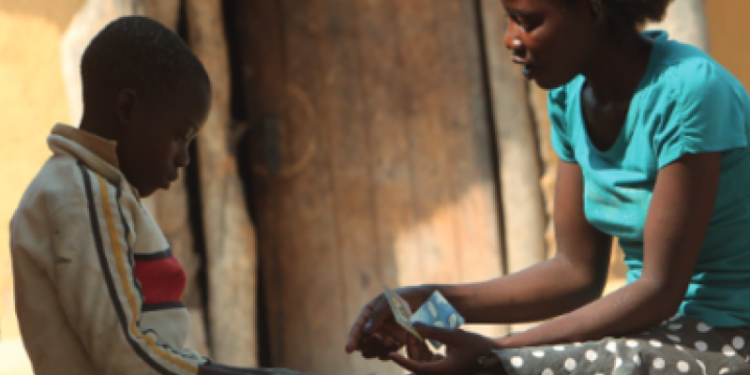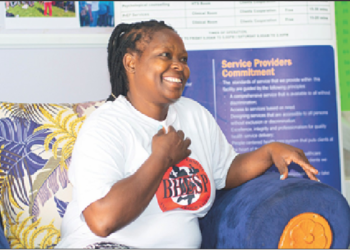finding out they had HIV and the specific trials they face.
Mary (not her real name) is 24 years old, an only child brought up by a single mother in Mathare slum, Nairobi, Kenya. She has been taking her antiretroviral drugs (ARVs) since she was born. But for a long time she did not know she was living with HIV. All she knew was that she had asthma, and she thought all the drugs were for chest problems.
“My mother died when I was 13 and in my final year of primary school. This was very challenging because I didn’t know how I would survive without her”, Mary told The Lancet HIV. To date she does not know what exactly killed her mother. All she can guess is maybe her mother was HIV positive.
“My aunty took over the responsibility of staying with me because I didn’t have a father. I had stopped taking my drugs because no one cared, and because I wasn’t feeling any pain I didn’t request them”, said Mary. 2 months later, Mary said, she became sick and was taken to the hospital by her aunty. After several tests, she was told that she was HIV positive.
“This was so shocking to me because I knew HIV means death. It dawned to me that the drugs I was taking were ARVs, and it was likely that my mother died of the disease”, she said, adding that to her surprise, her aunty did not seem surprised by the news.
After hours of crying and counselling, Mary was given more ARVs to take for at least 2 weeks before her next check-up. She was also introduced to the Organization of Young People Living with HIV in Kenya, Y+ Kenya, to help her through the process of acceptance. This, she says, worked because she was able to meet other young people who were HIV positive, and they all shared their stories.
Although Mary was trying hard to accept the situation and treat it as normal, at her aunty’s home things changed. She was given separate plastic utensils and a small mattress to sleep on the floor alone. She also hid her drugs under a charcoal sack in the kitchen so that her cousins would not see them and know her status.
“She was given separate plastic utensils and a small mattress to sleep on the floor alone. She also hid her drugs under a charcoal sack in the kitchen so that her cousins would not see them and know her status.”
“I knew it would be worse if they knew that I was HIV positive. But shortly when the charcoal reduced, I cut a hole in my mattress where I stored them. This seemed to work until I joined a boarding high school”, she said.
“My aunty really wanted me out of the house and so when I finished my primary school she got me a boarding school.”
Mary says that no one at the school knew her status: she told her friends that she had chest problems and that was why she was on medication. One day she collapsed while doing her manual work and one of her friends rushed to bring her drugs that one girl recognised as ARVs.
“This became a topic at school and no one wanted to associate with me. When we closed school I disposed my drugs in the latrine and just refused to take them anymore. I went for the refill and still dumped them in the latrine”, said Mary.
Mary’s health deteriorated again, but now her aunty kicked her out because she felt she had become a burden to the family. She moved to another relative who offered to continue paying her school fees, this time in a day school. The agreement was that as soon as Mary left school she would move to her own place.
Support and encouragement from the Y+ Kenya group became essential, because most of the youth in the group are HIV positive. When the COVID-19 pandemic struck, Mary says it was a challenge for her because there was no meeting with the other young people for support. Also, after the lockdown it became difficult for her to go to the facility to collect her drugs.
“There were no jobs to do at that time and getting transport to go and collect my drugs was a challenge. I had to skip taking my medicine for some days before the situation normalised”, she said. “Also, I avoided going to the hospital for my drugs because people had said whenever anyone goes to the facility they are isolated to be tested for COVID-19. So I stayed away.” She now collects her medicine after every 3 months to stock up.
According to UNICEF, if HIV service disruptions were to affect 100% of the population over a 6-month period between April and September, 2020, new HIV infections among young children could double as countries divert health-care resources to fighting the epidemic and implement various social distancing measures that can create delays in the supply chain of essential drugs and materials.
25-year-old Wilson Lore from Mombasa, Kenya, can vividly remember his sister taking drugs every day with him, even though his sister died when he was still very young.
“We were seven siblings, but it was only the two of us taking drugs every day in the morning and evening”, said Wilson. “When I was 7 or 8 years old my mother lied to me that the drugs were for my chest and I believed her.”
In 2003, his mum died of tuberculosis. His dad, who had two wives, did not provide for them. Lore did not have anyone to follow-up on his medication, so he stopped taking his drugs because he did not feel sick. Over time, he became sick and was taken to the hospital—this was when he found out that he was HIV positive.
“I remember going numb for a long time. I was worried that I would die and also what people would say if they knew I was HIV positive”, said Lore.
He was counselled and asked to go back the following day. He was then introduced to other young people around his age who were also HIV positive. From their stories he was convinced to take his drugs and adhere to them. It was difficult for him because that meant taking drugs for the rest of his life.
“I joined a youth support group— Y+ Kenya—where we encourage each other to adhere to treatment. I am now an ambassador and so I talk to other young people about the importance of testing and adhering to treatment”, he said.
“The challenge is the young people don’t understand why they should get tested first before indulging in any sexual act when they have not shown any sign of the disease. It is very difficult to convince them.”
During this COVID-19 pandemic, he says, it was very hard for him to adhere to his treatment especially during lockdown when there was no public transport to get to hospital and pick up medication.
“At some point I skipped taking my drugs because they were out of stock because of COVID-19. It is stressful that I have to take my medication every day. Sometimes I feel like giving up and just going to bed without worrying of my status like any other people. If I have not eaten well, I feel dizzy as a result of taking the drugs”, said Lore.
“I have a girlfriend who is also HIV positive and we encourage each other to adhere to the treatment.” Brenda Bakobye, programme officer at Y+ Kenya, says stigma makes it difficult for young people to adhere to treatment and is the biggest challenge for youth living with HIV.
When it comes to treatment, young people do not have adequate information, especially on the type of ARVs that they take, and sometimes they have no information on why they
“…it was very hard for him to adhere to his treatment especially during lockdown when there was no public transport to get to hospital and pick up medication. “
are taking medication. Some do not adhere to treatment because of social factors like poverty and peer pressure.
“When COVID-19 started, the government imposed the lockdown and, during this time, many young people we support under our programme could not travel to the other counties for their medication”, she said.
Most young people prefer getting their drugs far from home to avoid stigma. They would rather get their drugs in a place where no one knows them. When the lockdown was imposed, most facilities also stopped offering HIV services, such as viral load testing.
“We have about 500 youth, and during this pandemic time we have been communicating to them through social media, WhatsApp groups, and SMS reminding them about checking their viral load and taking their drugs on time. Also, wherever there is a shortage, we refer them to the other facilities where we have the drugs”, said Bakobye.
“What we noticed during this pandemic is that most young people don’t actually know how to check the expiry date of their drugs. Some even don’t know the name of their ARVs. They just know they are white or blue. Among the youth we are supporting, two of them died during the pandemic because they stopped taking their drugs. They were 23 and 26 years old.”
Some youth, she said, became depressed because they lost their jobs, and those who relied on meeting others for encouragement were unable to do so because of the lockdown.
Nutrition too is a problem. Most young people live in poor settlement areas, including the slums, and cannot afford a balanced diet. Because ARVs are strong drugs, some young people decide to stop taking them because of the side-effects. Bakobye added that there is a lot of misunderstanding and miscommunication among the youth on HIV testing, treatment, and adherence.
“There is need for advocacy to create awareness for the youth on HIV infections and treatment”, she noted.
According to Bakobye, the challenges most of young people face while on ARV treatment is the pill burden. Most of them, especially the young adolescents, feel the need for a drug holiday because they are fatigued of taking drugs every day. Disclosure especially by parents to young adolescents is another challenge, because parents do not tell them that the drugs they are taking are ARVs. They tell them that they are supplements.
“There is a lot of stigma for the youth with HIV. Through the Y+ programme we give them support and encouragement to adhere to ARV treatment. The support system is what is lacking”, said Bokabye.














